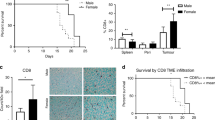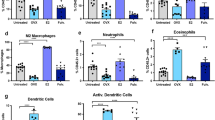Abstract
It has been suggested that tumour development and immunocompetence are affected by the menstrual and the oestrous cycle, and sex hormones have been shown to modulate lymphokine production, neuroendocrine activity and immunity. In this study, we assessed natural killer cell activity and host susceptibility to metastasis during the oestrous cycle in the Fischer 344 inbred rat strain. Females were inoculated intravenously with MADB106 tumour cells, a syngeneic mammary adenocarcinoma cell line that metastasises only to the lungs. The susceptibility to metastatic development of this tumour was found to be significantly higher during pro-oestrus and oestrus than during metoestrus and dioestrus. Two days of exposure to oestradiol benzoate caused similar effects in ovariectomised females, and a single administration of progesterone reduced this effect of oestradiol to a statistically non-significant level. The tumour was found to be negative for oestradiol receptors, and its in vitro proliferation rate was not affected by oestradiol or progesterone, suggesting that the effects of sex hormones on the metastatic process are not attributable to a direct effect on tumour cells. Because the metastatic process of MADB106 tumour cells is known, and confirmed here, to be highly controlled by large granular lymphocyte/natural killer (LGL/NK) cell activity, we assessed their role in mediating the effects of the oestrous cycle. The number and activity levels of circulating blood LG/NK cells (NKR-PI+ bright) were studied. Findings indicated oestrous-dependent alterations in the number of LGL/NK cells and suggested a diminished NK activity per LGL/NK cell during pro-oestrus/ oestrus, the same phases that were characterised by higher susceptibility to metastatic development. These findings provide the first empirical evidence for a causal relationship between a short-term exposure to elevated oestradiol/low progesterone levels and decreased resistance to tumour metastasis, and it is hypothesised that an alteration in LGL/NK cell activity underlies these effects. Homologies and relevance to clinical phenomena are discussed.
This is a preview of subscription content, access via your institution
Access options
Subscribe to this journal
Receive 24 print issues and online access
$259.00 per year
only $10.79 per issue
Buy this article
- Purchase on Springer Link
- Instant access to full article PDF
Prices may be subject to local taxes which are calculated during checkout
Similar content being viewed by others
Author information
Authors and Affiliations
Rights and permissions
About this article
Cite this article
Ben-Eliyahu, S., Page, G., Shakhar, G. et al. Increased susceptibility to metastasis during pro-oestrus/oestrus in rats: possible role of oestradiol and natural killer cells. Br J Cancer 74, 1900–1907 (1996). https://doi.org/10.1038/bjc.1996.651
Issue Date:
DOI: https://doi.org/10.1038/bjc.1996.651
This article is cited by
-
Harnessing cancer immunotherapy during the unexploited immediate perioperative period
Nature Reviews Clinical Oncology (2020)
-
Exploiting the critical perioperative period to improve long-term cancer outcomes
Nature Reviews Clinical Oncology (2015)
-
The marginating-pulmonary immune compartment in mice exhibits increased NK cytotoxicity and unique cellular characteristics
Immunologic Research (2014)
-
The Relationship Between Psychosocial Stressors and Breast Cancer Biology
Current Breast Cancer Reports (2010)
-
Prophylactic IL-12 treatment reduces postoperative metastasis: mediation by increased numbers but not cytotoxicity of NK cells
Breast Cancer Research and Treatment (2008)



